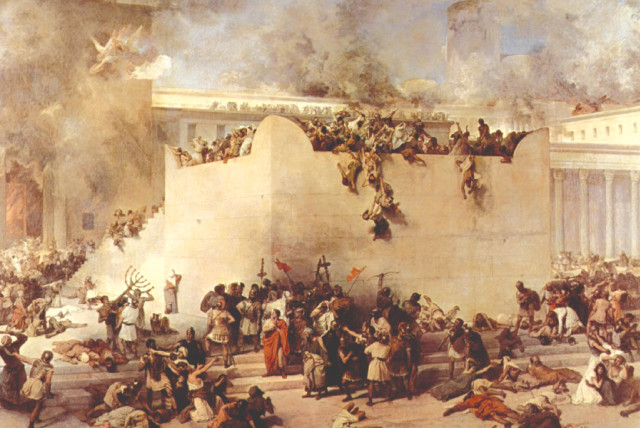Tisha B'Av 2024: What the Jewish summer fast day is all about - explainer

On Tisha B'av, the Jewish people mourn the two destructions of the First and Second Temples of Jerusalem. Here is everything you need to know.
Jews around the world are set to mark Tisha B'Av (the ninth day of the Hebrew month of Av) on Wednesday night and throughout the day Thursday, the anniversary of the destruction of the First and Second Temples in Jerusalem and when a number of other calamities in Jewish history occurred.
Tisha B'Av is first and foremost a fast day, where, Jews abstain from all food and water for an approximately 25-hour period, starting from sunset until nightfall the next day. It is also the time when the Jews read the Book of Lamentations (Megillat Eicha), in which the biblical prophet Jeremiah laments the destruction of Jerusalem and the subsequent exile from the Land of Israel.
What do we mourn on Tisha B'Av?
While most commonly associated with the destruction of the First and Second Temples, Tisha B'Av actually marks a number of calamities throughout Jewish history. Chronologically, the first such tragedy is believed to have been the sin of the spies. According to some traditions, the day that the 12 spies gave a slanderous report about the Land of Israel to the Jews in the desert, leading to that generation being forbidden from entering the land, is traditionally believed to have occurred on Tisha B'Av.
The Talmud recounts that when the Jews cried out in response to the spies' report and even expressed a desire to return to slavery in Egypt, God responded, "You wept needlessly, and I [will] establish for you [a night] of weeping for [future] generations."
A number of other events are often cited as being calamities befalling the Jewish people that occurred on or near the ninth of Av, including the Roman destruction of Betar and crushing of the Bar Kochba revolt; expulsion of the Jews from England, France, and Spain; the beginning of World War I; the formal approval of the Nazi's Final Solution; the mass deportation of Jews from the Warsaw Ghetto to concentration camps; the First Crusade; the 1994 bombing of the Argentine Israelite Mutual Association (AIMA) in Argentina by Hezbollah; Israel's 2005 Disengagement from the Gaza Strip; and most recently, Israel's passing of the controversial judicial reform legislation, the Law to Cancel the Reasonableness Standard.
What are the rules for Tisha B'Av?
On Tisha B'Av, the rules traditionally kept by Orthodox Jews include only washing one's hands up to the knuckles after using the bathroom or when washing hands in the morning, though if your hand is dirty above the knuckles, this may also be cleaned.Studying Torah, except for melancholy passages, laws of mourning and Tisha B'Av or Musar (Jewish morals), is forbidden on Tisha B'Av.Many Jews also hold that they should not greet one another with verbal greetings on Tisha B'Av. Sitting on a chair is forbidden until after halachic midday (shortly before 1 p.m. in Jerusalem and Tel Aviv on Thursday). Sitting on the floor or in a low chair is permitted.On the morning of Tisha B'Av, men do not wear a tallit (prayer shawl) or tefillin (phylacteries). The tallit and tefillin are put on during the Mincha (afternoon) prayers.
When does the fast start and end?
(Fast times are from MyZmanim. There are varying customs)
New York
Fast begins at: 7:57 p.m.
Fast ends at: 8:28 p.m.
Los Angeles
Fast begins at: 7:42 p.m.
Fast ends at: 8:11 p.m.
Jerusalem
Fast begins at: 7:29 p.m.
Fast ends at: 7:53 p.m.
Tel Aviv
Fast begins at: 7:27 p.m.
Fast ends at: 7:55 p.m.
Haifa
Fast begins at: 7:28 p.m.
Fast ends at: 7:56 p.m.
Beersheba
Fast begins at: 7:26 p.m.
Fast ends at: 7:54 p.m.
Eilat
Fast begins at: 7:23
Fast ends at: 7:50
Jerusalem Post Store
`; document.getElementById("linkPremium").innerHTML = cont; var divWithLink = document.getElementById("premium-link"); if (divWithLink !== null && divWithLink !== 'undefined') { divWithLink.style.border = "solid 1px #cb0f3e"; divWithLink.style.textAlign = "center"; divWithLink.style.marginBottom = "15px"; divWithLink.style.marginTop = "15px"; divWithLink.style.width = "100%"; divWithLink.style.backgroundColor = "#122952"; divWithLink.style.color = "#ffffff"; divWithLink.style.lineHeight = "1.5"; } } (function (v, i) { });

